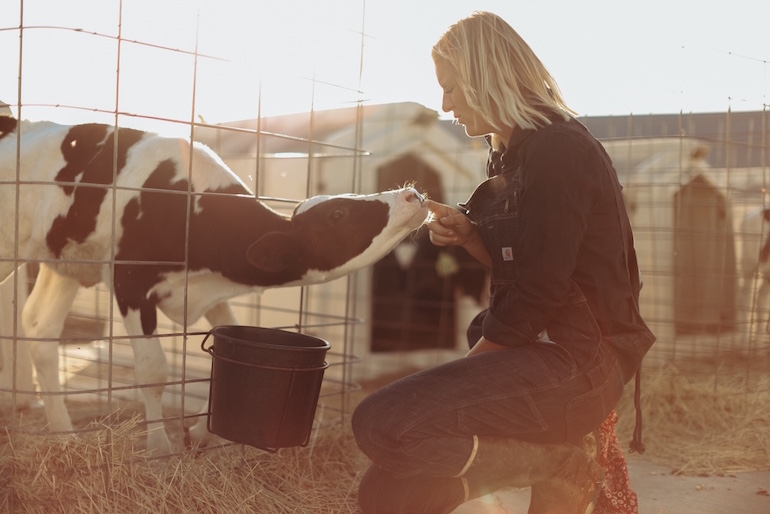Jen Beretta: Beretta Family Dairy

Dairy farming has deep roots in my family. I am a 4th-generation dairy woman at Beretta Dairy in Santa Rosa, which has been in the family for 63 years and counting. I am also fortunate to be a 6th-generation dairy woman with Dolcini Jersey Dairy, which has been run by my maternal family for generations. Both farms produce organic milk for Clover Sonoma. Working closely with my dad, Doug, and my brother, Ryan, we milk 300 cows on 400 acres. I’m responsible for feeding the calves, pasture rotation, and the USDA organic certification paperwork. We love to share our story of life on the farm.
Describe a typical day on your farm.
It depends on the season. In spring and summer, I wake up at 5:30 am, get my coffee, and drive down the road to the dairy to start moving our irrigation. We have 250 acres that we irrigate with Santa Rosa reclaimed waste-treated water. I then feed calves (we range from 40-60 calves at a time) and yearlings. Then I check the calving pen and see what is next on the list, including cleaning pens, sorting animals, or fieldwork. In the winter, we don’t have to irrigate, so I feed calves, check the calving pen, and so on.
Name three unexpected sensory delights of farming.
The smell of fresh air. The beauty of the sunrise and sunset. A calf’s tongue, which feels like sandpaper.
What sustainable or environmental practices are you most proud of?
Since we irrigate with reclaimed water, the only water we pull from the ground is for the cows to drink. We’ve also done several manure management upgrades, thanks in part to funding from the California Dept. of Food & Agriculture (CDFA) Alternative Manure Management Program (AMMP), as well as from the Healthy Soils Program (HSP). Previously we used a Bobcat tractor to scrape manure into a big pit every day, which took three hours and produced diesel emissions. The AMMP grant helped us install an automatic scraper system in our barn, which cuts out the fossil fuel and saves us time. We also installed a manure separator that separates the liquid from the solid portion. We use the liquids as fertilizer and the composted solids as cow bedding and on the fields.
In addition to the reduced carbon emissions from less diesel usage, we’ve reduced methane emissions from manure separation. Over five years, the estimated carbon dioxide equivalent reductions from these practices are 1,468 metric tons, or 3.689 million miles driven by an average passenger vehicle. This saves us a large amount of fuel, and the manure puts nutrients into our fields.
If you could change one thing about the food industry, what would it be, and why?
There are some dairy product certifications that are redundant, create more work for farmers, and can ultimately result in higher product costs. For example, having a non-GMO project verification in addition to USDA organic certification means double the paperwork, when USDA organic is already inclusive of the non-GMO project standard. More paperwork means time away from the farm, caring for what matters most.
What is your greatest challenge as a farmer?
The greatest challenge is around not knowing what the future of agricultural policy will dictate. Farmers and ranchers make up approximately 1% of the labor force in the U.S. We work hard to feed our country and produce quality products. Policy makers may not have firsthand knowledge around what it takes to run a farm, so it’s important to contact our elected officials and help educate them by opening up our farms for tours and informative conversations.
When you’re not farming, what are you doing?
I am President of Sonoma County Farm Bureau, serve as a 4-H dairy leader, and am on several agricultural boards. I also love to play slow-pitch softball.
Where can people find your products?
You can find Clover Sonoma products at local, independent and specialty markets, and throughout California at select Safeway, Whole Foods, Lucky, and Sprouts stores.
